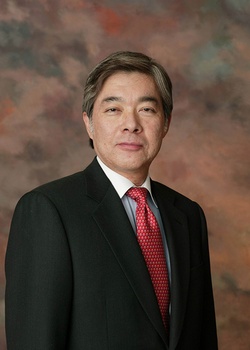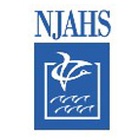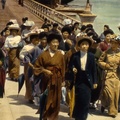In mid-January of 1994, President Bill Clinton received a 14-page paper on his desk entitled, “Repairing the U.S.-Japan Relationship.” The President read the paper, underlined and wrote comments on many passages, and sent it to several of his key officials with the words, “Worth reading. And often accurate. Should discuss.” The first page of the paper was stamped, “The President has seen.” The paper—which ended up in the headlines of almost every journal and newspaper concerned with transpacific relations—was written by Glen S. Fukushima, a Sansei from California.
In the past several years, there has been some debate in the community as to what role, if any, Japanese Americans should play in U.S.-Japan relations. While some state that Nikkei should serve as a bridge between the two countries, others say that the notion they should have such an obligation is unfair.
At a 2006 symposium entitled “Shifting Japanese American Identities,”—meant to coincide with the 100th anniversary of Japantown in San Francisco—Fukushima had the following advice for the largely Japanese American audience:
“Don’t be a bridge. A bridge is something to be walked over…Be players, actors, and decision-makers!”
If the influence of his “Repairing the U.S.-Japan relationship” is any indication, Fukushima has certainly followed his own advice.
Fukushima began his professional career as an attorney at a prominent Los Angeles law firm before becoming the Director for Japanese Affairs from 1985 to 1988 and then the Deputy Assistant United States Trade Representative for Japan and China from 1988 to 1990 at the Office of the United States Trade Representative (USTR), Executive Office of the President.
During those years, he travelled to Japan at least once a month for trade negotiations over a range of issues, including semiconductors, telecommunications, lawyers, and construction services. In 1990, he became regional director for Public Policy and Market Development at AT&T Japan, Ltd. And in 1992 he was elected vice president, then in 1997 president, of the American Chamber of Commerce Japan. More recently, Fukushima was appointed President and Chief Executive Officer of Airbus Japan K.K. and Senior Vice President of Airbus SAS, the European aircraft manufacturer.
Certainly a player in U.S.-Japan relations, and in the business world in general, Fukushima grew up with more contact with Japan and Japanese culture than many other Nikkei.
“My interest in Japan stems from the fact that my father, a Nisei who was in MIS, was stationed in Japan in the 1940s, 50s, and 60s because of his work in the U.S. Army,” Fukushima explains. “As a result, I spent my childhood growing up in California and Japan, although the Japan I experienced then was primarily on U.S. Army bases, attending American schools…although my parents raised me with a strong consciousness of my Japanese cultural background.
“Also, my mother was born and raised in Japan, although she has lived primarily in the U.S. since 1956,” he adds.
While other immigrant communities, like Chinese Americans, are interested and involved in the relationship between the U.S. and the country of their ancestry, Fukushima said that many Japanese Americans tried to distance themselves from Japan because they felt it was their being identified with Japan that led to their incarceration during World War II .
“Because I grew up primarily on U.S. military bases in Japan and the U.S., I grew up in a racially diverse environment and did not feel singled out as being odd or different,” he explains. “It was during the 1960s, when I was an undergraduate at Stanford University and involved in the Asian American Student Movement and anti-War in Vietnam activities that I started to feel a stronger sense of ethnic identity and solidarity as a person of color.”
During the 1971 to 1972 academic year, Fukushima took the opportunity to study abroad as an exchange student at Keio University in Tokyo. He says it was there he decided that “U.S.-Japan relations could be an interesting and productive field to pursue professionally.”
The following year, a famous professor at Columbia University stated that Japanese Americans couldn’t play a role in U.S.-Japan relations because “the Japanese don’t take Japanese Americans seriously.”
That was one reason he decided to go to graduate school not at Columbia but at Harvard, where he spent eight years in four degree programs. However, things have since changed. According to Fukushima’s comments at the symposium, increased openness to Japanese Americans is due to several factors. The globalization of Japan, he says, is forcing the country to cope with diversity. The children of businessmen who have lived abroad have caused many to question the definition of “Japaneseness,” and the younger generation is “not burdened with the preconceptions their parents had about Japanese Americans.”
He also cites the success of Nikkei in American society, including their leadership roles especially in the U.S. government, as other factors as to why—while historical, political, and cultural reasons prevent them from having the same relationship other ethnic groups have with the country of their ancestry—Nikkei today do have an opportunity to be a player in U.S.-Japan relations.
“Growing up in Japan and America (California), as a child I certainly benefited from knowing about both cultures. It is often said that one doesn’t truly understand one’s own culture until one is able to compare and contrast it with another culture,” Fukushima says. “In my case, knowing Japanese culture has helped me to understand better American culture, and knowing American culture has helped me to understand better Japanese culture. As an adult, I have worked in five professions—academia, journalism, law, government, and business.
“In each of these fields, my deep knowledge of two cultures has benefited my work, not only in the U.S. and Japan but also in my dealings with other regions of the world,” he continues. “For instance, in my current work I have daily dealings with France, Germany, England, and other European countries. My knowledge of the similarities and differences between the U.S. and Japan has helped me to deal more effectively with the various peoples and cultures of Europe.”
In his dealings with people from around the world, Fukushima has been greeted with varying reactions. He feels that the way in which he is viewed depends on the individual rather than that person’s ethnicity or nationality.
“Depending on the person, he or she views me as being more ‘American,’ ‘Japanese,’ or ‘a citizen of the world.’ A well-known Japanese businessman once described me as follows, ‘Mr. Fukushima is more American than American and more Japanese than Japanese,’” Fukushima explains. “[The Japanese business man explained that he meant] I could be logical, analytical, legalistic, individualistic, assertive, and self-confident (as many Japanese view the typical American to be) when I want to be, but I could also be gentle, caring, empathetic, polite, deferential, and team-oriented (as many Japanese view themselves to be) when I want to be.
“Knowing values that are commonly considered “traditional Japanese values” has obviously benefited me in my work dealing with Japanese—being polite, precise, and punctual; thinking about others and valuing group harmony; listening rather than talking; repaying debts; respecting elders; etc.,” he says. “At the same time, American and certain European cultures do not place such a high priority on such values, so adhering to them rigidly may not always be wise. One needs to be flexible and act according to what is most effective in that particular environment.”
Although Fukushima keeps an extremely hectic schedule of work and business trips, he tries to find time to enjoy travel, play tennis, attend concerts, visit museums, browse bookstores, and spend time with his wife, Sakie Tachibana Fukushima, whom he met at the 22nd Annual Japan-America Student Conference at Stanford in 1970. An avid music lover and violinist during his childhood, Fukushima listens to music by a wide array of artists ranging from rock and jazz performers such as Bob Dylan, Joan Baez, David Bowie, Kinks, Eric Clapton, Aretha Franklin, and Miles Davis, to classical performers such as Kyung-Wha Chung, Akiko Suwanai, Gidon Kremer, Murray Periaha, Carlos Kleiber, Charles Dutoit, and Kent Nagano, and Japanese pop singers such as Mayumi Itsuwa, Mari Takahashi, and Zard.
“At present,” Fukushima says. “I feel quite comfortable as a person who has personal, linguistic, and cultural roots in both the U.S. and Japan but who is flexible enough to work professionally in a global environment.”
* This article was originally published in Vol. XIX, Number 1, Spring 2008 issue of Nikkei Heritage, a journal of the National Japanese American Historical Society.
© 2008 National Japanese American Historical Society





